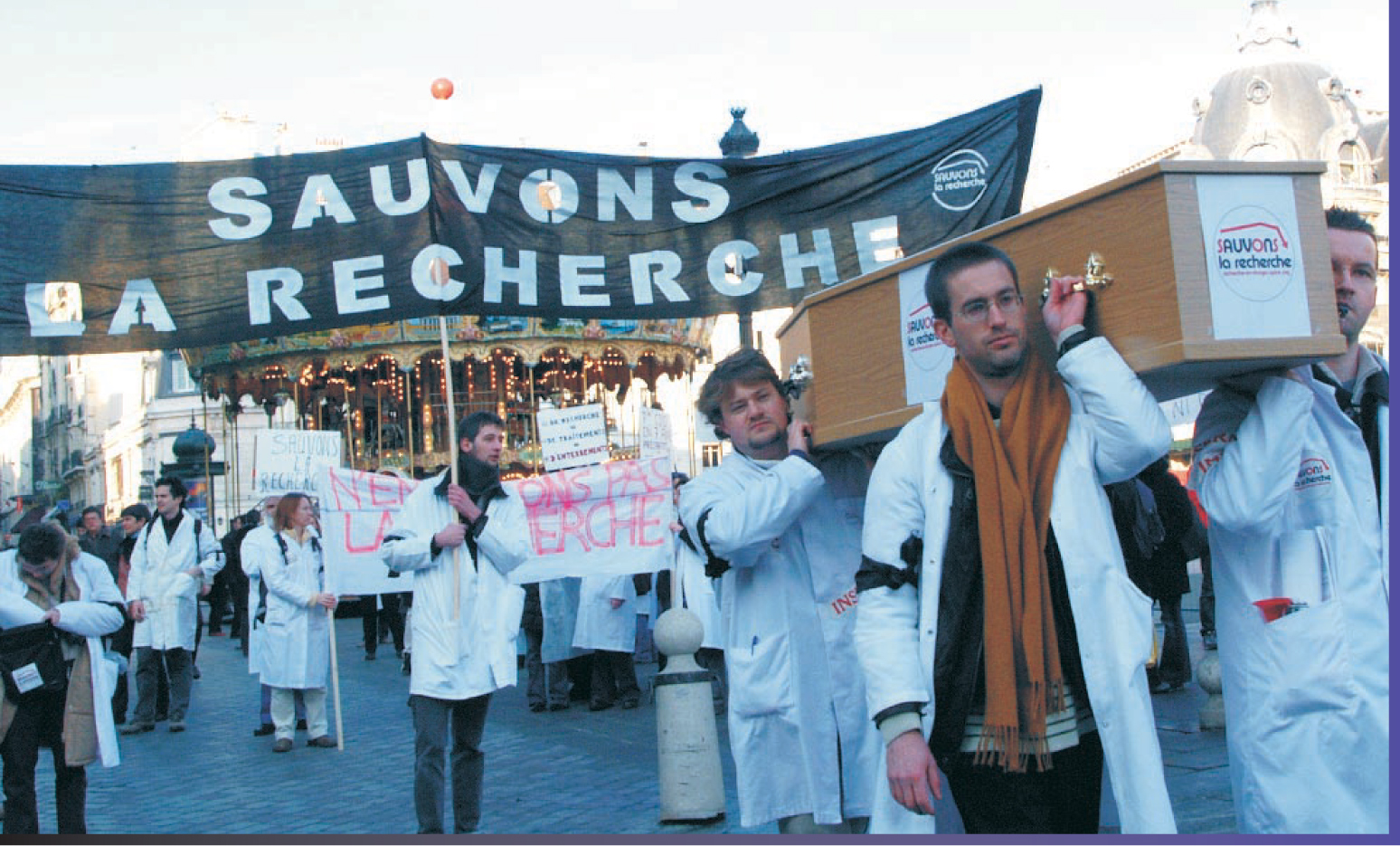French Scientists Take to the Streets to Save Research
DOI: 10.1063/1.1752415
Enough. That’s what some 1000 lab directors from across France were telling their government when they resigned en masse from their administrative responsibilities on 9 March. Enough budget cuts. Enough job reductions. Enough loss of autonomy.
In resigning—from their administrative duties only, not from their scientific positions—the researchers were carrying out a threat made in a petition to the government. The “Sauvons la Recherche” (save research) petition says that “fundamental research is currently being abandoned by the state.” It also says, among other things, that maintaining a topflight research capacity is essential; that targeting only specific research areas is untenable; that without fundamental research, applied research will collapse; and that, if the government does not act quickly, young scientists will make their careers elsewhere, and France will lose the capacity to train the next generations of scientists. In the two months between 7 January, when it was first posted on the Web, and the day of the resignations, the petition was signed by 65 000 researchers, or about 65% of the country’s total research force (see http://recherche-en-danger.apinc.org
Acting “collectively against the planned destruction of France’s research capacity,” the petitioners made three requests: immediate payment of money owed CNRS and other research agencies; more permanent positions in both research agencies and universities; and an open discussion leading to a long-term policy plan for research.
Government response
By the petitioners’ deadline of 9 March, the government had taken some steps in their direction. In late February, research minister Claudie Haigneré announced that payment of ά294 million (roughly $364 million) owed the national research agencies from 2002 and 2003 would be accelerated and completed this year. The government will also create 120 additional permanent jobs in the research agencies and set up a national committee to plan the future of research, she said.
But the government’s response is not sufficient, according to the researchers. “They say they will release money owed to CNRS and INSERM [the French Institute of Health and Medical Research]. That is good. But as far as jobs, we are getting far from what we want,” says Georges Debrégeas, a CNRS physicist at the Collège de France in Paris and a leader of the Sauvons la Recherche movement. Researchers want 550 more permanent jobs in the research agencies plus 1000 in universities this year—the agency positions had been converted this year into temporary contracts. “We cannot engage in discussion with the government as long as we don’t get these emergency measures,” says Debrégeas.
The government’s initial proposal for a national committee to look into the future of science was met with distrust about its inclusiveness. “We want a public debate, where people from different parts of the country, from universities and labs, take part,” says Debrégeas. “The ministry wants it to be consulting heads of organizations and then proposing something that is already written. That would not allow us to propose reforms.”
Acting as go-betweens in the days leading up to the resignations, Etienne-Emile Baulieu and Edouard Brézin, the president and vice president, respectively, of the French Academy of Sciences, suggested that the academy organize a forum for formulating a long-term research strategy later this year. “The Sauvons la Recherche movement trusts us, and the government is more likely to listen to us than to the movement,” says Brézin, who is also president of the French Physical Society and who, like Baulieu, did not sign the petition but sympathizes with the protestors. “One of the main questions our consultation should settle is, Is it better to keep money at the ministry level? Or should it go to the agencies? Nobody really trusts the ministry’s ability to allocate money with scientific criteria.”
In an open letter to the research ministry in February, Henri Audier, a chemist who is a member of the CNRS administrative council and of the Sauvons la Recherche organizing committee, noted that the government has responded quickly to complaints by hunters, tobacconists, and restaurateurs. He wrote, “The scientists feel humiliated and scorned. … They are stunned that one can respond with such facility to corporate demands … but that there is no response to the shout that France and Europe will lack high-school teachers, university instructors, doctors, and engineers.”
‘We will slowly decay’
Discontent among researchers has been growing over the past two years as money for the national research agencies has been slashed by 25–30%. But the protests exploded full force after President Jacques Chirac said in a New Year’s speech that research is his absolute priority. Says Brézin, “Strangely enough, that speech started the protests. The reaction was, ‘Stop laughing at us, stop lying to us.”’
While the government avows its commitment to science, labs increasingly feel the pinch. “There has been turmoil in physics in the CEA [atomic energy commission] for months,” says Jean Zinn-Justin, head of the commission’s astro-, nuclear-, and particle physics division. Without more funding for basic science, he says, “we won’t be able to start new projects. We will slowly decay.” (Because of the way the CEA works, however, its lab directors decided not to sign the petition.) At the Ecole Normale Supérieure, adds Brézin, “my colleagues are telling me they need a laser. CNRS has no money for this sort of midscale equipment, so they have to wait until at least 2005. In low-temperature physics, a helium liquefier broke down a few months ago. Until a replacement arrives at the end of the year, we have to buy helium on the market, where it costs 10 times as much. The result is that several experiments will stop because we don’t have money. That’s where physics is hit. And at less famous places, it is worse.”
“What makes me mad is that a lot of spending goes to things which are not demanded by the science community in Europe—manned flight in space, the International Space Station, a megajoule laser for the military,” says Brézin. “We have doubts about ITER [the international thermonuclear energy reactor]. A lot of spending choices are political, not scientific.”
Indeed, a key concern among researchers is the government’s centralization of science-related decision making. Says Didier Chatenay, a bio-physicist at Strasbourg’s Institute of Physics who quit his administrative responsibilities in the 9 March protest, “Some things do not function properly. The people who can best identify problems are those who are doing science. The solutions can’t come from the ministry.”
Perhaps more than anything else, the dim prospects for young scientists have galvanized the nationwide protests. In the French system, scientists traditionally get permanent jobs early, so if they spend time in a temporary job, they are likely to have more trouble finding work in academic or industrial research later. “Therefore, young scientists are either unemployed or they emigrate to the US,” says Audier. “It’s a contradiction: We need them, but we drive them away.”
A big mess
It’s too early to say what effect the resignations might have. With no one officially in charge of a lab, no purchases or hires can be made. Indeed, for security reasons, the lab is supposed to remain closed. More broadly, all researchers who signed the petition intend to isolate the research ministry by, for example, refraining from reviewing grants, submitting progress reports, or even applying for ministry-administered grants. “It’s going to be a big mess, but it won’t stop the country—we are not the railroads,” says Debrégeas. “It’s a symbolic move.”
On 9 March, lab directors—accompanied by an estimated 10 000–15 000 researchers—walked from Paris’s City Hall to the research ministry, where they handed in their letters of resignation. Before the procession, they met to plot out the next steps for the Sauvons la Recherche movement. As of press time, big demonstrations were planned and strikes were being considered. French postdocs abroad were organizing protests in cities around the world, and scientists internationally had begun their own petition in support of researchers in France. Regional elections scheduled for late March were expected to have an impact, especially if, as some predicted, the research minister is ousted. Meanwhile, the researchers’ movement has been building ties to artists, teachers, and other sectors of the population. According to a national poll on the day of the resignations, 82% of the French population supports the movement.
Says Debrégeas, “Beyond jobs, beyond money, what we are fighting for is, Who makes decisions for science? Is there a place for fundamental science in this country?”

In a mock wake, researchers mourned the death of science in an early March demonstration in Paris.
AGNÈS ANNE/LEM P7 FRANCE

More about the authors
Toni Feder, American Center for Physics, One Physics Ellipse, College Park, Maryland 20740-3842, US . tfeder@aip.org





